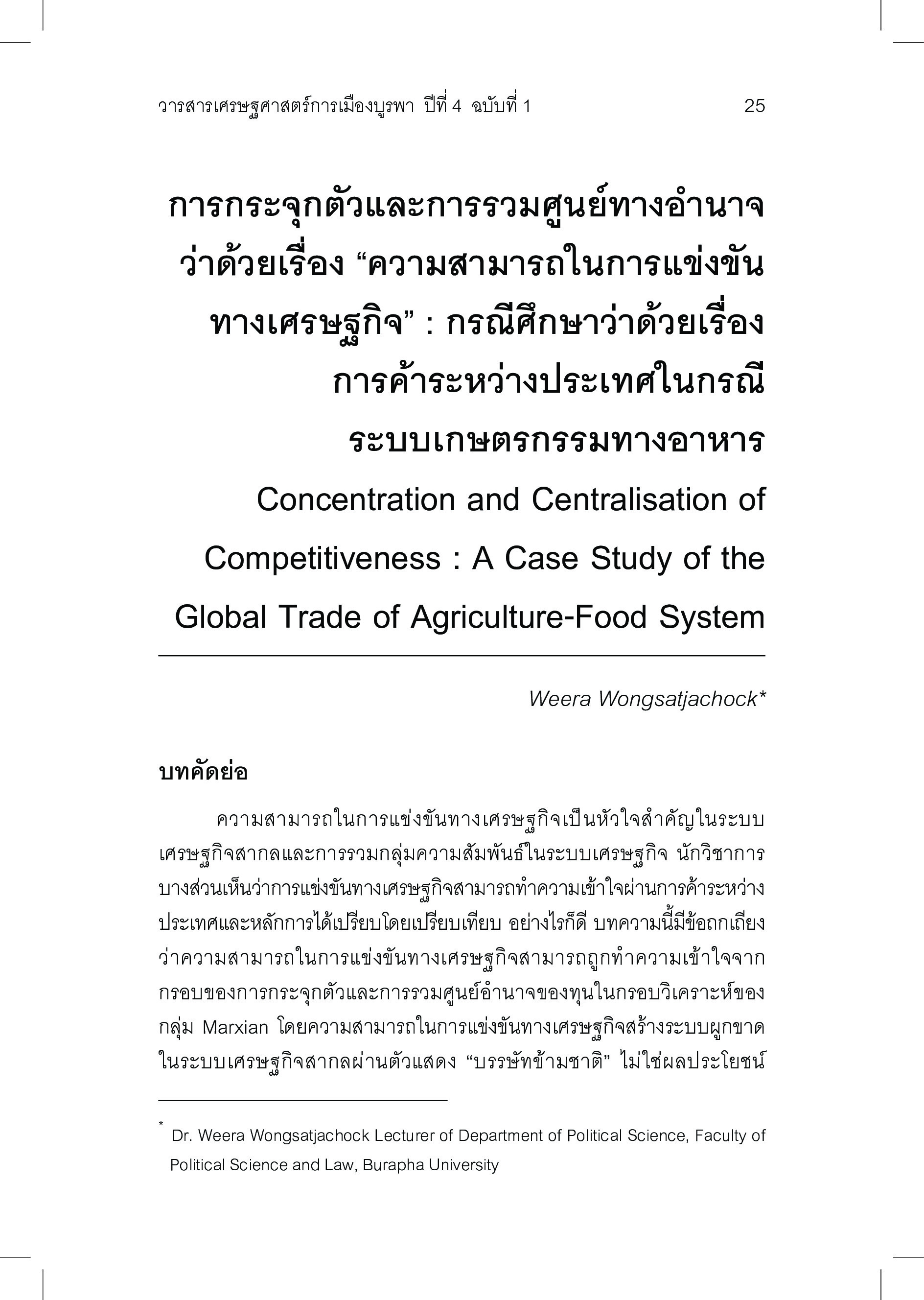Concentration and Centralisation of Competitiveness : A Case Study of the Global Trade of Agriculture-Food System
Keywords:
Concentration, Centralisation, Competitiveness, Global Trade, Agriculture-Food SystemAbstract
Competitiveness is a key of global economy and economic integration. Some people note that competitiveness can be understood and promoted by international trades and comparative advantages. However, this article argues that competitiveness can be vividly examined as a concentration and centralisation of capitals in term of Marxian economics. The competitiveness has created monopolisation of global economy through key actors that are transnational corporations (TNCs), rather than national interests. Moreover, the monopolisation has been enhanced by multilateral agreements. To apply Marxian political economy and practice, a case study of the global trade of agriculture-food system is elucidated to show the process of concentration and centralisation of global economy. The competitiveness has created new form of food regime as “corporate food regime” that has agri-food TNCs as a key actor. Concentration of TNCs power is constituted by the giant corporates-state relations, multilateral agreement, and neoliberal hegemonic idea of indicator of competitiveness.
References
Anderson, K. & et al. (2007). “Chapter 17: Global Impacts of the Doha Scenarios on Poverty”. In T.W. Hertal and L.A. Winters. (eds.). Putting Development Back into the Doha Agenda: Poverty Impacts of a WTO Agreement. Washington D.C.: The World Bank.
Baines, J. (2014). “Food Price Inflation as Redistribution: Towards a New Analysis of Corporate Power in the World Food System”. In New Political Economy, 19(1), pp. 79-112.
Baran, P. A. & Sweezy P. M. (1966). Monopoly Capital: An Essay on the American Economic and Social Order. New York and London: Monthly Review Press.
Cerny, P. G. (1997). “Paradoxes of the Competition State: The Dynamics of Political Globalization”. In Government and Opposition, 32(2), pp. 251-274.
_______. (2010). Rethinking World Politics: A Theory of Transnational Neopluralism. Oxford; Oxford University Press.
DeWalt, B. R. (1985). “Mexico’s Second Green Revolution: Food for Feed”. In Mexican Studies / Estudios Mexicanos, 1(1), pp. 29-60.
Dicken, P. (2011). Global Shift: Mapping the Changing Contours of the World Economy. Sixth Edition. New York and London: The Guilford Press.
ETC Group. (2008). Who Owns Nature?: Corporate Power and the Final Frontier in the Commodification of Life, Wordsmith Services and YellowDog.
Fairbairn, M. (2010). “Framing Resistance: International Food Regimes and the Roots of Food Sovereignty”. In Hannah Wittman, Annette Desmarais and Nettie Wiebe. (eds.). Food Sovereignty: Reconnecting Food, Nature, and Community. Oxford: Pambazuka Press, pp. 15-32.
Foster, J. B. (1986). The Theory of Monopoly Capitalism: An Elaboration of Marxian Political Economy. New York: Monthly Review Press.
Friedmann, H. (1982). “The Political Economy of Food: The Rise and Fall of the Postwar International Food Order”. In American Journal of Sociology, 88(S), pp. S248-S286.
_______. (1987). “Family Farms and International Food Regimes”. In Teodor Shanin. (ed.). Peasants and Peasant Societies: Selected Readings. Oxford: Basil Blackwell, pp. 247-258.
Hay, C. (2012). “The ‘Dangerous Obsession’ of Cost Competitiveness … And the Not So Dangerous Obsession of Competitiveness”. In Cambridge Journal of Economics, 36(2), pp. 463-480.
Heffernan, W.D. (1998). "Agriculture and Monopoly Capital". In Monthly Review, 50(3), pp. 46-59.
Hobson, J.M. (2004). The Eastern Origins of Western Civilisation. Cambridge: Cambridge University Press.
Holt-Giménez, E. & Shattuck, A. (2011). “Food Crises, Food Regimes and Food Movements: Rumblings of Reform or Tides of Transformation”. In The Journal of Peasant Studies, 38 (1), pp. 109-144.
Holt-Giménez, E. & Peabody, L. (2008). “From Food Rebellions to Food Sovereignty: Urgent Call to Fix a Broken Food System”. In Food First Backgrounder, 14 (1), pp. 1-6.
Jessop, B. (2013). “The Complexities of Competition and Competitiveness: Challenges for Competition Law and Economic Governance in Variegated Capitalism”. In Michael W. Dowdle, John Gillespie, and Imelda Maher. (eds.). Asian Capitalism and the Regulation of Competition: Towards a Regulatory Geography of Global Competition Law. Cambridge: Cambridge University Press, pp. 96-120.
Krugman, P. (1994). “Competitiveness: A Dangerous Obsession”. In Foreign Affairs, 72(2), pp. 28-44.
Magdoff, F. & Foster, J. B. & Buttel F. H. (2000). “An Overview”. In Fred Magdoff, John Bellamy Foster, and Frederick H. Buttel. (eds.). Hungry for Profit: The Agribusiness Threat to Farmers, Food, and the Environment. New York: Monthly Review Press, pp. 7-21.
McMichael, P. (1992). “Tensions between National and International Control of the World Food Order: Contours of a New Food Regime”. In Sociological Perspectives, 35(2), pp. 343-365.
_______. (1996). “Globalization: Myths and Realities”. In Rural Sociology, 61(1), pp. 25-55.
_______. (2000). “Global Food Politics”. In Fred Magdoff, John Bellamy Foster, and Frederick H. Buttel. (eds.). Hungry for Profit: The Agribusiness Threat to Farmers, Food, and the Environment. New York: Monthly Review Press, pp.125-143.
_______. (2009). “A Food Regime Genealogy”. In The Journal of Peasant Studies, 36(1), pp. 139-169.
O’Driscoll, G. P. & Cooper, S. F. (2010). “International Trade and Global Stability”. In Bradley A. Thayes and Nuray V. Ibryamova. (eds.). In Debates in International Relations. New York: Pearson Education, pp. 192-199.
Paarlberg, R. (2010). Food Politics: What Everyone Needs to Know. Oxford: Oxford University Press.
Porter, M. E. (1985). Competitive Advantage: Creating and Sustaining Superior Performance. New York: The Free Press.
Schoenberger, E. (1998). ‘Discourse and Practice in Human Geography’. In Progress in Human Geography, 22 (1), pp. 1-14.
Taylor, M. (2008). “Introduction”. In Marcus Taylor. (ed.). Global Economy Contested: Power and Conflict acroos the International Division of Labour. London and New York: Routledge, pp.1-8.
Thun, E. (2011). “The Globalization of Production”. In John Ravenhill. (ed.). Global Political Economy. Third edition. Oxford: Oxford University Press, pp. 283-304.
Wise, T. A. (2008). The Limited Promise of Agricultural Trade Liberalization. Working Group on Development and Environment in the Americas, Discussion Paper Number 19.
Wittman, H. & Desmarais, A. & Wiebe, N. (2010). “The Origin and Potential of Food Sovereignty”. In Hannah Wittman, Annette Desmarais and Nettie Wiebe. (eds.). Food Sovereignty: Reconnecting Food, Nature, and Community. Oxford: Pambazuka Press, pp.1-14.






